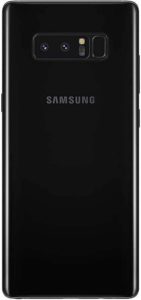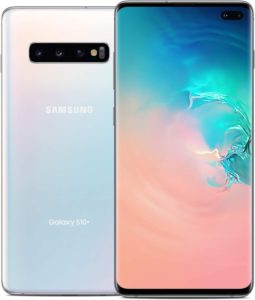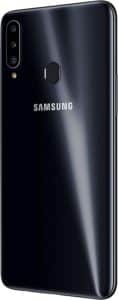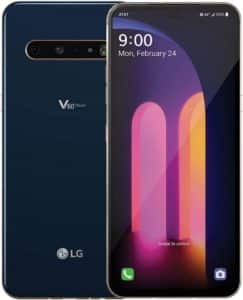Forget better cameras, these are the lowest radiation cellphones on the market today plus a simple way to test how much radiation your cell phone emits.
Table of Contents
- The best low radiation cellphones: our top picks
- Samsung Galaxy S10 Plus
- Samsung Galaxy A20s (SM-A207F/DS)
- LG V60 ThinQ 5G
- Makes and Models of the Best Low Radiation Phones
- The Apple iPhones with the lowest radiation (SAR) score
- Why should I care about my smartphone and radiation?
- SAR – How to Determine Cellphone Radiation
- Samsung phones are usually low radiation
- How to Minimize Radiation from Cellphones
- The bottom line
Shopping for a new smartphone is both exciting and confusing. There are choices over the operating system, memory, camera specifications, network compatibility, and sustainability. What about the radiation emitted by your cellphone, though? Are all phones just as bad as each other? Nope!
For the third year running, our top pick for the lowest radiation cellphone is a popular Samsung model. This brand makes some of the lowest radiation cellphones available in North America, doing so much better than pretty much any other company making smartphones today. That said, for 2023, a handful of other companies have made our list for the lowest emitting smartphones, including LG, Motorola, Nokia, Sony Mobile, and Google.
Here are our top picks for the lowest radiation smartphones for 2023, followed by a look at how to find out the SAR score of your smartphone (and why it matters).
The best low radiation cellphones: our top picks
Below, you’ll find our picks for the best low radiation cellphones.
Curious about how we rate products? Click here to view our methodology, which at its core, is about voting with our dollars to fight climate change.

Overall Winner for Lowest Radiation Smartphone: Samsung Galaxy Note 8 DUOS (SM-N950 / DS)
Highlights: The lowest radiation smartphone available in America!
For the third year running, with a SAR of 0.17, the Samsung Galaxy Note 8 with dual sim is the lowest radiation smartphone available today in the U.S.
The Samsung Galaxy Note 8 has dual cameras – 12MP rear camera’s with OIS and 8MP front Camera with auto focus – offering great selfies and great quality photos. There’s also a 6.3-inch edge-to-edge screen and a built in S Pen.
For storage, expect 64 GB of internal memory with a removable Micro SD slot to expand storage up to 256GB. You also get 6GB RAM and, my favorite feature, this one is water and dust-resistant! (Though I haven’t tested it for resistance to toddlers or sand).
Why we like Samsung
Samsung is one of the most sustainable companies currently offering smartphones for use in the U.S. It has taken steps towards implementing a circular materials economy, boasting a decent takeback recycling program. The company also tends toward using eco-friendly packaging that can be upcycled, including turning TV box packaging into a cat house or end table.
That said, Samsung has also invested in cluster munitions, so it’s not all sunshine and roses at the company.
Free eBook: Simple Steps to a Greener Home
Concerned about climate change? Learn actionable tips for making each room in your home greener.
"*" indicates required fields


Samsung Galaxy S10 Plus
Highlights: Long battery life and a low SAR score!
With a long battery life of 12 hrs, 35 minutes, and a SAR score of just 0.26, the Samsung Galaxy S10 Plus is a great choice for a more energy efficient and low radiation smartphone from a more sustainable company.
This smartphone is a great choice if you’re a video or photo nerd. It boasts a full set of pro lenses, including ultrawide and micro-zoom and you can enjoy live video bokeh, precision audio focus, and super-stabilization. There’s tons of customization options, making this almost as good as a full-on digital camera.
The Galaxy S10+ is also great for sharing all those photos and videos as you can easily connect it with up to 5 other compatible devices at the same time using Bluetooth and WiFi. Better yet, there are no limits on file type or size!
The Samsung Galaxy S10+ is super slim and has a 6.4-inch edge-to-edge screen with excellent graphics. It charges fast and has superb battery management, optimizing battery use to keep it running all day.

Samsung Galaxy A20s (SM-A207F/DS)
Highlights: Low SAR (0.35) and almost 14 hours of battery life!
Combining a low SAR (0.35) with one of the best battery lives (13 hrs, 46 mins!), the Samsung Galaxy A20 is a great choice for a newer smartphone.
The Galaxy A20s has a big screen with an edge-to-edge 6.5 inch Infinity V display. This smartphone also boasts three cameras – 13MP, 5MP Depth Camera, and 8MP Ultra Wide Camera – making for great selfies and panoramas.
For power and performance, this smartphone has an Octa core processor and 3GB/4GB of RAM, meaning it’s a good bet for graphic-heavy games and livestreaming. It has 32/64GB of internal memory and up to 512GB of external storage.

LG V60 ThinQ 5G
Highlights: Low radiation and great battery life!
With a relatively low SAR value of 0.352 and one of the best battery lives around (12 hrs, 46 mins), the LG V60 ThinQ 5G is a great choice for an energy efficient, low radiation smartphone.
Why we like LG
LG Electronics is a South Korean company that boasts some credible eco-friendly initiatives. It’s one of our top picks for eco-friendly TVs, making award-winning TVs that are easier to recycle, for instance. LG introduced its Eco-Index in 2011 as an internal environmental assessment standard for product sustainability. The company’s goal is to increase the proportion of more sustainable and energy-efficient Green 3 Star products in its range, as detailed in LG’s sustainability report (2020-2021).
LG is also shooting for a 50% reduction in carbon emissions in the production stage by 2030 over 2017 levels. The company is also aiming for complete carbon neutrality and already claims to use 80% renewable energy in its American business operations.
As for toxicology, LG Electronics complies with international regulations on hazardous substances including RoHS and REACH, and has a supply chain green management program, the Green Program Plus, to monitor hazardous substances. The company is also phasing out phthalates, antimony trioxide and beryllium in products and is working on removing PVC and BFRs too.
Makes and Models of the Best Low Radiation Phones
The SAR (Specific Absorption Rate) is a measure of the amount of radio frequency energy absorbed by your body when you use the handset. There is wide variation between SAR scores for smartphones, and one of the best resources for finding out a SAR score for a phone you don’t have in your physical possession is the BfS listings.
Once again, for 2023, the BfS rankings show that the lowest SAR scores are associated with a range of satellite phones and smartphones only available in Europe. There are, however, quite a few Samsung phones too, along with a few LG, Motorola, Sony Mobile, Nokia, and even Google phones, all of which can be bought and used in North America.
Looking specifically at radiation measured when the phone is held to the ear (rather than the body), the following phones emit the least radiation and were available in North America at the time of writing (November 2022):
| Make | Model | SAR at ear (not body) | Where to Buy |
|---|---|---|---|
| Samsung | Galaxy Note 8 DUOS (SM-N950 / DS) | 0.17 | View Price on Amazon |
| Samsung | Galaxy Note 8 (SM-N950) | 0.17 | View Price on Amazon |
| Samsung | Galaxy Note 10+ 5G (SM-N976B) | 0.19 | View Price on Amazon |
| Samsung | Galaxy Note10+ (SM-N975F) | 0.19 | View Price on Best Buy |
| Samsung | Galaxy Note10 (SM-N970F) | 0.21 | View Price on Amazon |
| Samsung | Galaxy A72 | 0.23 | View Price on Amazon |
| LG | LG G7 ThinQ (LM-G710EM) | 0.24 | View Price on Amazon |
| Samsung | Galaxy S20 FE | 0.24 | View Price on Amazon |
| Samsung | Galaxy S8+ DUOS (SM-G955) | 0.26 | View Price on Amazon |
| Samsung | Galaxy S10 5G (SM-G977B) | 0.26 | View Price on Amazon |
| Motorola | razr 5G | 0.27 | View Price on Amazon |
| Sony Mobile | Xperia 5 II | 0.28 | View Price on Amazon |
| LG | LG V60 ThinQ 5G | 0.35 | View Price on Amazon |
| LG | Wing | 0.36 | View Price on Amazon |
| Fairphone | Fairphone FP3 | 0.39 | View Price on Fairphone / Walmart Canada |
| Motorola | One Fusion | 0.40 | View Price on Amazon |
| Nokia | C21 Plus | 0.40 | View Price on Amazon |
| Pixel 5a | 0.47 | View Price on Amazon |
Sadly, many of the smartphones that emit the least radiation are only available in Europe or Asia, with some of the best Samsung models now discontinued in North America. Note, too, that Fairphone doesn’t currently work in North America, even if you do find one to buy here. Similarly, several of the models above only work with certain networks in the U.S. Several of the phones above are a great choice unless you want them to work with Verizon/Sprint, for example.
Free eBook: Simple Steps to a Greener Home
Concerned about climate change? Learn actionable tips for making each room in your home greener.
"*" indicates required fields

The Apple iPhones with the lowest radiation (SAR) score
| Model | SAR at ear/head | SAR at body | Where to Buy |
| Apple – iPhone 11 (Model A2221) | 0.95 | 0.99 (measuring distance: 0.5 cm) | View Price on Amazon |
| Apple – iPhone 11 Pro Max (Model 2218) | 0.95 | 0.99 (measuring distance: 0.5 cm) | View Price on Amazon |
| Apple – iPhone 13 mini | 0.97 | 0.98 (measuring distance: 0.5 cm) | View Price on Apple |
| Apple – iPhone 12 / mini / max | 0.98 | 0.99 (measuring distance: 0.5 cm) | View Price on Best Buy / Best Buy / Best Buy |
| Apple – iPhone 13 | 0.98 | 0.99 (measuring distance: 0.5 cm) | View Price on Apple |
| Apple – iPhone SE 2020 | 0.98 | 0.99 (measuring distance: 0.5 cm) | View Price on Best Buy |
Why should I care about my smartphone and radiation?
All cellphones emit radiation. How much varies by model and how you use the phone. Radiation from cellphones is not proven to cause cancer or any disease, but lack of proof isn’t lack of health impact.
If you’re looking for a primer on the health impact of cellphones, a good starting place for research is the CDC’s webpage on cellphone radiation FAQ. The FDA also maintains information on cellphones and health which you may find useful.
We’ll leave the health impact to the scientists. Instead, we’ll assume you’re here because you’re concerned about smartphone radiation and want to know how to tell how much radiation your phone emits and if there’s a low radiation phone that might be a better option for you.
SAR – How to Determine Cellphone Radiation
The SAR, or Specific Absorption Rate, is a measure of the amount of radio frequency energy absorbed by your body when you use the handset. Phones vary widely for SARs, but it’s very simple to find out the SAR for any given phone. That includes the smartphone you’re probably using to read this article!
To find the SAR for your iPhone or most other smartphones:
- Open up your dial pad as though you’re about to make a call
- Type in *#07# and click call
- This will redirect you to a part of the settings on your phone
- Click on RF Exposure
- Scroll down to the link to a webpage with information for your device
You can also access this information on other phones using the same code. Some just pop up the SAR right away while others might take you to the settings on your phone. You can also find this on your iPhone through Settings, General, Legal and Regulator, RF Exposure, where you’ll find that link to the same webpage.
I was pretty shocked to see that my iPhone 7S has an RF exposure of 1.19, nearly ten times higher than the lowest emitters! And older iPhone models were tested at a greater distance from the head than newer models held to higher standards!
Samsung phones are usually low radiation
Although there’s great variation among cellphones, one thing is consistent: Samsung phones tend to have exceptionally low SARs. This is probably because in 2006 Samsung released a range of phones with a new style of antenna. Prior to 2003, the FCC in the US had a rule mandating omnidirectional antennas, i.e. those that transmitted in all directions. After 2003, Samsung (and other companies) were free to do things differently, which is why Samsung’s newer antenna radiates most of the RF away from the handset user.
That said, a 2019 investigation by the Chicago Tribune found that both the iPhone 7 and several Samsung models far exceeded the FCC’s regulations for SAR, prompting retesting by the FCC itself as well as by Samsung. In short, it’s no simple matter trying to figure out which phones have the lowest radiation.
One way to find at least some reassurance is to check the German Federal Office for Radiation Protection (Bundesamt für Strahlenschutz, BfS) which maintains a comprehensive database of smartphones and the amount of radiation they emit when held to the ear during a call. You might also want to check for the German certification for environmental friendliness ‘Der Blaue Engel’ (Blue Angel), which only certifies phones with a SAR below 0.60 watts per kilogram (far lower than the FCC’s 1.6 W/kg).
How to Minimize Radiation from Cellphones
Again, the CDC has a great webpage on this topic. The CDC clearly states, that while more research is needed, there is no scientific evidence conclusively linking cellphone radiation to diseases such as cancer.
However, if you’re concerned about radiation exposure, there are a few ways to reduce your exposure to radiation from your phone.
These include:
- Texting instead of calling
- Using your phone’s speaker function
- Wearing a phone headset or earpiece
- Using a landline!
- Using Pong’s cellphone cases that refocus RF energy away from your head without reducing signal strength.
In addition to the steps above, you can also intentionally make your next smartphone one with a low specific absorption rate (SAR) rating,
Free eBook: Simple Steps to a Greener Home
Concerned about climate change? Learn actionable tips for making each room in your home greener.
"*" indicates required fields

The bottom line
While the scientific evidence is unclear, some of us may want to limit exposure to radiation from all sources. Using a cellphone with a lower SAR score is one strategy for less radiation exposure in our everyday lives. If this is a topic you’re interested in and want to dig further, also be sure to have a look at our review of the safest microwaves.
It’s worth remembering, though that most smartphones only last two to three years, after which they’re usually traded in (hopefully) or shoved in that miscellany drawer of electronics (come on, we all have one!). Some companies are trying to do better, with more sustainably built smartphones coming to market that have a longer life, are designed with circular economy principles in mind, and that emit less radiation than earlier models.
If you’re less concerned about the radiation emitted by your smartphone and more concerned about overall sustainability, we’ve also got you covered for the best energy efficient and most sustainable smartphones.
Does battery size affect SAR rating?
Hi,
Interesting question! Seemingly, the answer is no – battery size doesn’t correlate with SAR.
However, I did find this interesting study that suggests emissions are greatest when making a call when a phone’s battery is very low (1%) or is charging.
Thanks!
Leigh
I was soo excited about the Terra Cube when I first read this! The $199 price tag with free shipping and removable battery, is HUGE! Unfortunately, the SAR rating is just too high for me as it’s really my main concern. I think I’m going to go with a Galaxy Note, S8, or S9 perhaps.
Hi Brody,
Thanks for the comment. Like you, I was also super excited about TeraCube but the SAR rating put me off. I’m hoping the company takes this into consideration in any redesigns. And if I hear of any such updates, I’ll be sure to add a note here.
Thanks for reading!
Leigh
Hi,
I’m interested in a sony experia 5ii,
That is a 4g phone.
I’m having a hard time finding the sar rating.
Can u please help me?
Thanks
Hi Deborah,
Sony lists all the SAR values on its site, so a quick search for Experia 5 suggests: “The highest SAR value as reported to the authorities for this phone model when tested for use by the ear is 0.39 W/kg and when worn on the body is 0.43 W/kg and for WiFi hotspot mode is 0.79 W/kg.”
Hope that helps!
Leigh
sar too high imo. Wonder why Mudita Pure (german) wasn’t mentioned? What about non-smartphones.
Thank you for your info VERY helpful and informative!! Have you ever tested if any of the radiation lowering or eliminating devices(EMF protectors/EMF cell phone guards) make a difference to what the cell phone emits/SAR rating? Maybe one of those is how to lower the radiation on the TeraCube so those of us who want to buy it but don’t like the SAR rating could purchase it with less concern. Any idea if those devices make a difference or really work?? Thanks again:)
Thanks so much for your kind time in sharing such useful information. 🙂
The reason why I am looking this up is because I have the iPhone Apple – iPhone 11 Pro Max, and I’ve had it since 2020. Lately every time I hold the phone or touch the phone my hands or fingers start to get tingly and in pain. Not like wrist pain from texting or using my phone for long periods of time. Its pain just under the skin and the tinging aching pain can last for hours. and its the points of contact where I am holding the phone. Right now the feeling is on my left palm, where i usually hold it and my pointer finger on my right hand which are the areas today that have touched the iPhone. I am trying to learn about what i happening and most sites lead to bogus information about wrist or finger pain from being texting constantly. That is not it, this feels like damage happening to my cells or write underneath the skin. Apple forums have other people that feel this way too, but apple is of no help and says its not something that happens. Others are saying they’d have to prove this is happening for apple to do anything about it. I’m feeling at a loss right now, and would usually get a new iPhone but I don’t want to be supporting them if this is what their phones are doing to people and their not going to take responsibility for it. I would love to hear any recommendation or feedback. Thanks
Samsung Galaxy Note 8 DUOS has reached end-of-life status.
I have a Google Pixel (not the pro) and I also feel tingling/warm sensation only on the hand that holds the phone. I am convinced it from the phone’s radiation. Ever since I got this phone my hands look so aged, I’m 30 and my hands look like I’m 50! Also using this phone, I have had spontaneous hearing loss in my right ear that I use to talk on the phone and when I switched to the other ear now that ear is having a hard time. My face feels so warm and inflamed inside my ear when I’m talking and holding to my ear too.
Didn’t LG stop making cell phones? If so, how old is the information on this page?
Hi Chris,
We updated this piece at the end of 2023.
Yes, LG wound down its cellphone production in 2022, but it has pledged to support firmware updates through summer 2025, and some LG phones are still a good bet for low radiation.
So, if someone is in need of a phone for a short period of time, an LG model could be ideal.
Thanks for checking in,
Leigh
Hi there,
I did a quick google search re Pong’s cell phone cases and there a lot of reviews and articles saying they don’t work? Is Safe Sleeve better in your opinion ?